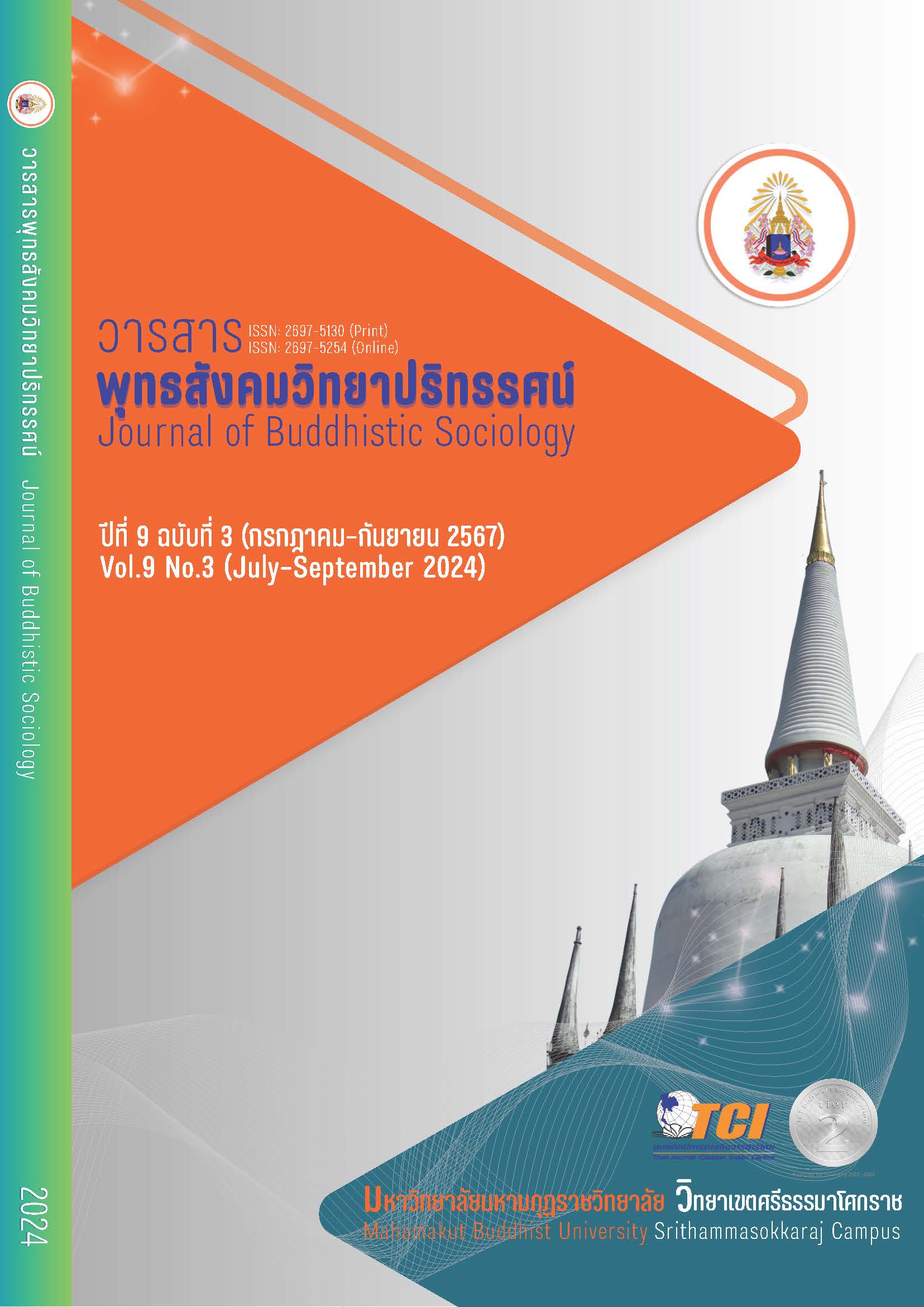EVALUATION OF THE MORALS AND ETHICS DEVELOPMENT OF STUDENTS AT THUNGSONG TECHNICAL COLLEGE UNDER OFFICE OF THE VOCATIONAL EDUCATION COMMISSION
Main Article Content
Abstract
This research aimed to evaluate 1) the reaction of training participants, 2) the learning of training participants, 3) the behavior of training participants, and 4) the results of training participants. The sample consisted of 16 teachers and 214 students, totaling 230 persons. The research tools were the five-rating-scale questionnaire to evaluate the training participants' reactions, behavior, and outcomes, the pretest-posttest to evaluate the learning of training participants, and the interview form to evaluate the outcomes of the training participants. The statistics used for data analysis were percentage, mean, standard deviation,
t-test, and content analysis.
The research findings were as follows:
- The overall evaluation for reaction was high-level. When considering each item, the Appropriateness of Speakers had the highest average, followed by the Appropriate Outcomes of the Project. The item with the lowest average was the Appropriateness of the Training Duration.
- For learning evaluation, the learning achievement after the training was higher than before at a statistically significant level of 05. Regarding the students' attitudes, satisfaction was highest for all issues.
- The overall evaluation for behavior was at the highest level. When considering each item, "the students have good interpersonal skills, respect, and polite manners" had the highest average. The second highest was "the students were economical." The item with the lowest mean was "the students are united."
- For outcome evaluation, the student's overall outcomes were at the highest level. When considering each item, the item with the highest average was "the training influences the students to have discipline, gratitude, and abstain from causes of ruin." The item with the second highest average was "the students have a public mind," and the lowest mean was "the students have knowledge about morals and how to apply them."
Article Details

This work is licensed under a Creative Commons Attribution-NonCommercial-NoDerivatives 4.0 International License.
References
กระทรวงศึกษาธิการ. (2542). พระราชบัญญัติการศึกษาแห่งชาติ พุทธศักราช 2542. กรุงเทพมหานคร: คุรุสภาลาดพร้าว.
จิระพงษ์ สุริยา. (2563). การประเมินโครงการพัฒนาคุณธรรมจริยธรรมของนักเรียนโรงเรียนสรรพวิทยาคม. วารสารคุรุสภาวิทยาจารย์, 1(3), 68-78.
ชูชาติ แปลงล้วน. (2560). การประเมินโครงการพัฒนาคุณธรรมจริยธรรมนักเรียนในโรงเรียนคุณธรรม สพฐ. สำนักงานเขตพื้นที่การศึกษาประถมศึกษาเชียงราย เขต 4. Journal of Social Science and Buddhistic Anthropology, 5(7), 379-393.
ธานินทร์ ศิลป์จารุ. (2549). การวิจัยและวิเคราะห์ข้อมูลทางสถิติด้วย SPSS (พิมพ์ครั้งที่ 7). กรุงเทพมหานคร: สุวีริยาสาส์น.
นฤมล วิทยาวุฒิรัตน์. (2562). การประเมินโครงการพัฒนาคุณธรรมจริยธรรม โรงเรียนคลองเมืองพิทยาคม. วารสารเทคโนโลยีและสื่อสารการศึกษา คณะศึกษาศาสตร์ มหาวิทยาลัยมหาสารคาม, 2(4), 97-98.
นาซีฟะ เจ๊ะมูดอ. (2560). การวิจัยเชิงประเมินโครงการเสริมศักยภาพครูสอนตาดีกาในโรงเรียนสามจังหวัดชายแดนภาคใต้โดยใช้รูปแบบการประเมินของเคิร์กแพทริค. ใน วิทยานิพนธ์ศึกษาศาสตรมหาบัณฑิต สาขาวิชาการวิจัยและประเมินผลการศึกษา. มหาวิทยาลัยสงขลานครินทร์.
ประภาศรี สีหอําไพ. (2550). พื้นฐานการศึกษาทางศาสนาและจริยธรรม. กรุงเทพมหานคร: จุฬาลงกรณ์มหาวิทยาลัย.
พระศรชัย วังคำ. (2553). การประเมินผลสัมฤทธิ์หลักสูตรฝึกอบรมคุณธรรม “ค่ายพุทธบุตร-พุทธธรรม”. ใน วิทยานิพนธ์ศึกษาศาสตรมหาบัณฑิต สาขาวิชาเทคโนโลยีการวิจัยและพัฒนาหลักสูตร. มหาวิทยาลัยเทคโนโลยีราชมงคลธัญบุรี.
ยุพิน รอดประพันธ์. (2561). การประเมินโครงการโรงเรียนคุณธรรมโดยประยุกต์ใช้รูปแบบการประเมินแบบซิป (CIPP Model) โรงเรียนบ้านห้วยธารทหาร สำนักงานเขตพื้นที่การศึกษาประถมศึกษานครสวรรค์ เขต 3. นครสวรรค์: โรงเรียนบ้านห้วยธารทหาร.
สุวิมล ติรกานันท์. (2547). การประเมินโครงการแนวทางสู่การปฏิบัติ. กรุงเทพมหานคร: จุฬาลงกรณ์มหาวิทยาลัย.
อดิศักดิ์ จินดานุกูล. (2545). รายงานผลการอบรมหลักสูตรการอบรมเชิงปฏิบัติการสร้างสื่อคอมพิวเตอร์ช่วยสอน. กรุงเทพมหานคร: หน่วยศึกษานิเทศก์ กรมสามัญศึกษา.


